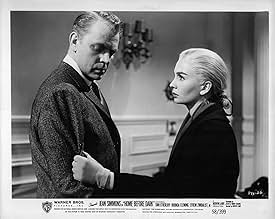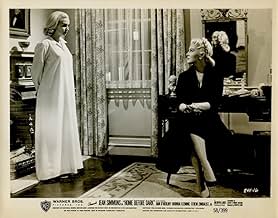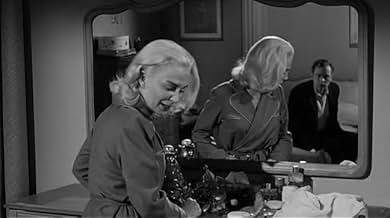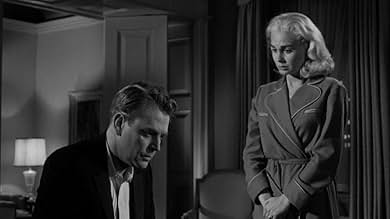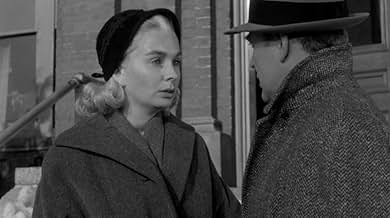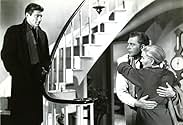VALUTAZIONE IMDb
7,1/10
1309
LA TUA VALUTAZIONE
Aggiungi una trama nella tua linguaSimmons is magnetic as Charlotte, her lovely, delicate face reflecting the inner turmoil of a woman battling for sanity after she walks out of a mental institution.Simmons is magnetic as Charlotte, her lovely, delicate face reflecting the inner turmoil of a woman battling for sanity after she walks out of a mental institution.Simmons is magnetic as Charlotte, her lovely, delicate face reflecting the inner turmoil of a woman battling for sanity after she walks out of a mental institution.
- Regia
- Sceneggiatura
- Star
- Premi
- 4 candidature totali
Stephen Dunne
- Hamilton Gregory
- (as Steve Dunne)
Walter Bacon
- Professor Dennison
- (non citato nei titoli originali)
Fred C. Blau Jr.
- Male Patient
- (non citato nei titoli originali)
Gail Bonney
- Mental Hospital Clerk
- (non citato nei titoli originali)
Evelyn Clarke
- Receptionist
- (non citato nei titoli originali)
Lillian Culver
- Mrs. Franklin
- (non citato nei titoli originali)
Susan Davis
- Saleslady
- (non citato nei titoli originali)
Recensioni in evidenza
Charlotte (Jean Simmons) comes home from a mental hospital, shaky but game. She's been cured of all her delusions - that her husband and stepsister are having an affair, and conspiring behind her back. Except that her husband (Dan O'Herlihy) really does crave her stepsister (Rhonda Fleming) and they do talk about her in whispered tones. Even their new lodger (Efrem Zimbalist) can see it. But they deny it and she tries to deny it some more, to keep peace in the family. Finally, she can't. Is she having a breakdown or a breakout?
Admittedly, it is slow - the direction is cumbersome. But occasionally, it nails Eileen Bassing's novel with its stifling New England academic atmosphere and the rigidity of its codes. Jean Simmons was nominated for Best Actress in this role, and small wonder; it's one of her best this side of Elmer Gantry. Steve Dunne has an engaging appearance, and it's Rhonda Fleming who gets to be unsympathetic for a change.
If I could find the video, I'd buy it. But it's not for teenaged boys.
Admittedly, it is slow - the direction is cumbersome. But occasionally, it nails Eileen Bassing's novel with its stifling New England academic atmosphere and the rigidity of its codes. Jean Simmons was nominated for Best Actress in this role, and small wonder; it's one of her best this side of Elmer Gantry. Steve Dunne has an engaging appearance, and it's Rhonda Fleming who gets to be unsympathetic for a change.
If I could find the video, I'd buy it. But it's not for teenaged boys.
When the film begins, you learn that Charlotte Bronn (Jean Simmons) had been in a mental hospital for a year and was ready for discharge. Oddly, it also seems as if there's been no family therapy or plans for after discharge...a bit of a mistake in the film, I think, as I cannot imagine the hospital doing this. Apparently, Charlotte's husband, Arnold (Dan O'Herlihy) also had not visited her during this year AND he has no plans on changing the family structure which existed when Charlotte lost her mind and attacked her step-sister, Joan (Rhonda Fleming). Yet, oddly, she's discharged. I think it would have made more sense having the staff argue with Arnold and mention these problems---and he checked her out against medical advice. This portion of the movie could have been constructed better.
When Charlotte returns home, you can almost instantly see what drove her off the deep end. Her step-mother (Mabel Albertson) is god- awful--a controlling know-it-all who would have probably gotten Mother Theresa to attack her after being around her more than five minutes! Albertson made a career out of playing these awful mothers...and anyone who knows 60s TV will instantly recognize her. As for the step- sister, there are hints through the course of the movie that Joan and Arnold MIGHT be carrying on behind Charlotte's back...or at least Arnold simply didn't care that Charlotte might think this. He was certainly very cold and very distant throughout the film. In many, many ways, the story seems like a primer to teach family members how to keep mentally ill loved ones mentally ill or drive them over the edge. Is there any hope for poor Charlotte and this kooky bunch? And what about the new boarder, Jake (Efram Zimbalist Jr.)?
As I was at one time a mental health therapist, I see that the film has an excellent point to make. Returning to the exact same unhealthy environment is a sure way for disaster if you have psychological or addiction issues. Changing the family or leaving them entirely when they are resistant to change is something most decent therapists would consider working on with their clients as they face discharge. Because of this, I really appreciate the movie and it talks about things rarely talked about in films about mental illness. It's often NOT just the mentally ill person that is sick but the family structure.
As far as entertainment value goes, this film is very enjoyable and late in the film you really begin to wonder what is actually happening. Is Charlotte losing her mind or is Arnold trying to drive her over the edge...or both? My only quibble (other than the one mentioned in the first paragraph) is that the film went on too long and the portion consisting of them going to visit Harvard didn't seem to quite fit with the rest of the movie. Still, very compelling and different..and the very end was great.
When Charlotte returns home, you can almost instantly see what drove her off the deep end. Her step-mother (Mabel Albertson) is god- awful--a controlling know-it-all who would have probably gotten Mother Theresa to attack her after being around her more than five minutes! Albertson made a career out of playing these awful mothers...and anyone who knows 60s TV will instantly recognize her. As for the step- sister, there are hints through the course of the movie that Joan and Arnold MIGHT be carrying on behind Charlotte's back...or at least Arnold simply didn't care that Charlotte might think this. He was certainly very cold and very distant throughout the film. In many, many ways, the story seems like a primer to teach family members how to keep mentally ill loved ones mentally ill or drive them over the edge. Is there any hope for poor Charlotte and this kooky bunch? And what about the new boarder, Jake (Efram Zimbalist Jr.)?
As I was at one time a mental health therapist, I see that the film has an excellent point to make. Returning to the exact same unhealthy environment is a sure way for disaster if you have psychological or addiction issues. Changing the family or leaving them entirely when they are resistant to change is something most decent therapists would consider working on with their clients as they face discharge. Because of this, I really appreciate the movie and it talks about things rarely talked about in films about mental illness. It's often NOT just the mentally ill person that is sick but the family structure.
As far as entertainment value goes, this film is very enjoyable and late in the film you really begin to wonder what is actually happening. Is Charlotte losing her mind or is Arnold trying to drive her over the edge...or both? My only quibble (other than the one mentioned in the first paragraph) is that the film went on too long and the portion consisting of them going to visit Harvard didn't seem to quite fit with the rest of the movie. Still, very compelling and different..and the very end was great.
I can certainly sympathize with those who have commented about the lack of a video release of this title, and their disappointment at its apparent abandonment in the archives of TV broadcasters. I saw it during its initial theatrical release, when some very positive critical notices told me I'd be in for a much-better-than-average viewing experience. Not only was I impressed with its quality but, even though I've never seen it since, I can still quite easily recall several of its key sequences and the excellent performances by everyone in the cast.
After quite a run at Twentieth-Century Fox in a long string of their CinemaScope costumers, Jean Simmons must have truly enjoyed exercising her considerable talents as an actress with the lead role in "Home Before Dark," under the steady hand of Hollywood veteran, Mervyn LeRoy. He was one director who always seemed to get the best out of his casts and had a special gift, it seems to me, of eliciting surprisingly good performances from those lovely ladies, such as Rhonda Fleming in this one, who were usually thought of merely as "glamor girls."
When this film was released I was a relatively new resident of southern California, so its effective use of Boston and other Massachusetts locations, where I'd been born and raised until almost entering my teens, may be the reason that the memory of this film is still quite vivid. Those of us who would like to see a video release might nurture a wisp of hope, what with so many more films now enjoying an entry onto the video catalogues. It's certainly worthy of a place along some of Hollywood's better psychological dramas.
After quite a run at Twentieth-Century Fox in a long string of their CinemaScope costumers, Jean Simmons must have truly enjoyed exercising her considerable talents as an actress with the lead role in "Home Before Dark," under the steady hand of Hollywood veteran, Mervyn LeRoy. He was one director who always seemed to get the best out of his casts and had a special gift, it seems to me, of eliciting surprisingly good performances from those lovely ladies, such as Rhonda Fleming in this one, who were usually thought of merely as "glamor girls."
When this film was released I was a relatively new resident of southern California, so its effective use of Boston and other Massachusetts locations, where I'd been born and raised until almost entering my teens, may be the reason that the memory of this film is still quite vivid. Those of us who would like to see a video release might nurture a wisp of hope, what with so many more films now enjoying an entry onto the video catalogues. It's certainly worthy of a place along some of Hollywood's better psychological dramas.
This is a strong drama built entirely on Jean Simmons' outstanding performance as a woman recovering from a breakdown and searching for love and a home, only to find her own strength instead. Director Mervyn LeRoy and novelist/screenwriter Eileen Bassing confidently put the entire burden on Simmons, who appears in nearly every scene, and the actress delivers a character who continually defies and exceeds the expectations of those around her, and the viewer.
We meet Charlotte Bronn as she is returning from a long stay in a mental hospital following a nervous breakdown that included episodes of violence and paranoia. She's shaky and vulnerable and painfully self-aware. But even before she first appears at the end of the long hallway, walking towards the camera and into her new life, those closest to her have already begun to let her down.
We quickly begin to learn the source of her downfall, but Simmons doesn't give us a victim and the film doesn't back away from real mental illness- the portrayal of Charlotte's recovery and gradual tilt towards relapse is surprisingly sharp and modern.
"Home Before Dark" is understated, in an almost documentary style, more smart than clever, but the energy and pacing are crisp enough that the film always seems within one twist of becoming a noir thriller or Hitchcock suspense. Charlotte is desperate for acceptance, her husband's love, and the truth about her marriage, all of which are withheld, and we naturally expect a handsome man- any of several on hand- to step forward and solve her problems, either romantically or as a confidant. The film's value comes from its steady refusal to take those easy paths.
The pathos is tastefully understated but powerful nonetheless- Charlotte says she's not beautiful, she says she knows her husband doesn't love her and that she's not worthy of love- and her husband simply fails to contradict her. The film is, among other things, a relentless study of one spouse failing another.
We root for Charlotte Bronn as she stumbles- her story never does. This is one of Simmons' best.
We meet Charlotte Bronn as she is returning from a long stay in a mental hospital following a nervous breakdown that included episodes of violence and paranoia. She's shaky and vulnerable and painfully self-aware. But even before she first appears at the end of the long hallway, walking towards the camera and into her new life, those closest to her have already begun to let her down.
We quickly begin to learn the source of her downfall, but Simmons doesn't give us a victim and the film doesn't back away from real mental illness- the portrayal of Charlotte's recovery and gradual tilt towards relapse is surprisingly sharp and modern.
"Home Before Dark" is understated, in an almost documentary style, more smart than clever, but the energy and pacing are crisp enough that the film always seems within one twist of becoming a noir thriller or Hitchcock suspense. Charlotte is desperate for acceptance, her husband's love, and the truth about her marriage, all of which are withheld, and we naturally expect a handsome man- any of several on hand- to step forward and solve her problems, either romantically or as a confidant. The film's value comes from its steady refusal to take those easy paths.
The pathos is tastefully understated but powerful nonetheless- Charlotte says she's not beautiful, she says she knows her husband doesn't love her and that she's not worthy of love- and her husband simply fails to contradict her. The film is, among other things, a relentless study of one spouse failing another.
We root for Charlotte Bronn as she stumbles- her story never does. This is one of Simmons' best.
I have seen many Jean Simmons' movies, and I thoroughly enjoyed this one.
I saw it as a young teenager on TV in Memphis, Tennessee, and it made quite an impression on me at the time. I haven't seen it since, but I still remember so many images from the movie. Not only was the acting excellent, I felt that I almost knew the characters personally. Jean Simmons was tremendous, as always. I have ordered other movies of hers, and have taped the ones from TV that I could.
The tone of the movie was also an important part of the story. As I recall, it was cold, winter, and filmed in Black and White, which gave it more of an impact. It's just occurred to me that since I saw it in b&w, I don't know if it was made in b&w, or if it was in color, since I was viewing it on a b&w TV. I think the starkness of the b&w made it very effective. I continue to look for it on TV and would LOVE to have a copy of this movie, if it ever becomes available! Donchu
I saw it as a young teenager on TV in Memphis, Tennessee, and it made quite an impression on me at the time. I haven't seen it since, but I still remember so many images from the movie. Not only was the acting excellent, I felt that I almost knew the characters personally. Jean Simmons was tremendous, as always. I have ordered other movies of hers, and have taped the ones from TV that I could.
The tone of the movie was also an important part of the story. As I recall, it was cold, winter, and filmed in Black and White, which gave it more of an impact. It's just occurred to me that since I saw it in b&w, I don't know if it was made in b&w, or if it was in color, since I was viewing it on a b&w TV. I think the starkness of the b&w made it very effective. I continue to look for it on TV and would LOVE to have a copy of this movie, if it ever becomes available! Donchu
Lo sapevi?
- QuizSince this was a film by Warner Brothers, much of the soundtrack was stock and is the same as used in their 1942 film Perdutamente tua (1942).
- BlooperArnold drives Charlotte home from the hospital in a snowstorm, when plenty of snow already covers the ground. At the film's conclusion, it's New Year's Eve and Charlotte mentions that she's been home for 3 months, which means that the snowstorm happened at the end of September.
I più visti
Accedi per valutare e creare un elenco di titoli salvati per ottenere consigli personalizzati
- How long is Home Before Dark?Powered by Alexa
Dettagli
- Data di uscita
- Paese di origine
- Lingua
- Celebre anche come
- Home Before Dark
- Luoghi delle riprese
- Marblehead, Massachusetts, Stati Uniti(Interior scenes and exterior scene filmed at 2 Union St. "The Layfayette House")
- Azienda produttrice
- Vedi altri crediti dell’azienda su IMDbPro
Botteghino
- Budget
- 1.390.000 USD (previsto)
- Tempo di esecuzione2 ore 16 minuti
- Colore
- Proporzioni
- 1.78 : 1
Contribuisci a questa pagina
Suggerisci una modifica o aggiungi i contenuti mancanti

Divario superiore
By what name was Pietà per la carne (1958) officially released in India in English?
Rispondi
